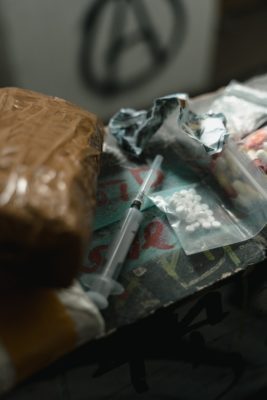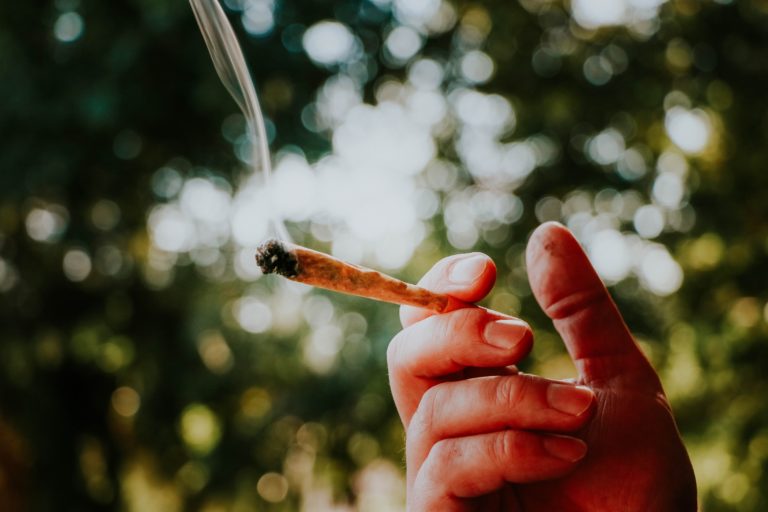What Makes a Drug Addictive?

By The Orlando Recovery Center
Editor Melissa Carmona | Medically Reviewed By Sara G. Graff, LCSW
Last Updated: November 1, 2023
For decades, drug addiction was thought of as a moral failure. We now know so much more about the scientific realities of this medical condition. A chronic but treatable condition, addiction is a disease. Also known as a substance use disorder (SUD), addiction involves uncontrolled use of drugs or alcohol despite negative, harmful consequences.
Addiction is complex and influenced by several factors, including genetics, environment and interactions with brain chemistry. Understanding what makes drugs addictive and how they impact the people who use them can help reduce the stigma around this disease and get people the help they need.
Understanding Drug Addiction
Drug addiction is a chronic and relapsing disorder where someone compulsively seeks out drugs and uses them, despite adverse consequences.
Certain substances affect brain circuits that affect stress, reward, and self-control. These changes may continue long after someone stops using drugs. Since there is a functional change to brain circuits, addiction is considered a brain disorder.
According to doctors and researchers, addiction has similarities to other chronic diseases. For example, if someone has heart disease, it affects the normal and healthy function of the organ, like addiction affects the brain. Chronic diseases can be treated and prevented. If untreated, they may get worse and lead to sometimes fatal health consequences.
What Makes Drugs Addictive?
All addictive substances have different effects on the brain, but also specific similarities. Addictive drugs produce a surge of dopamine in a part of the brain called the basal ganglia. Dopamine is a neurotransmitter. Neurotransmitters transmit messages between our nerve cells. The basal ganglia are part of the brain that controls reward. This area of the brain also affects our ability to learn based on whether or not something is rewarding.
When someone repeatedly uses a substance that increases dopamine, it trains the brain to associate the rewarding feeling of the dopamine flood with the substance. As the cues grow increasingly linked to the substance, it becomes more difficult to stop thinking about it. If our brains link the use of a substance to that pleasure, then we’re compelled to keep seeking them out.
Are All Drugs Addictive?
Drugs can include prescription medications, over-the-counter drugs, illicit drugs, alcohol and tobacco. Not all drugs are addictive. Also, not everyone who uses addictive drugs will develop an addiction. Psychoactive drugs are the ones we generally consider addictive because they affect mental processes and the reward pathway. These effects can include cognition, mood and emotion.
What Are the Most Addictive Drugs?
A drug’s addictive potential can vary depending on the person using it, how much it affects the dopamine system, and how pleasurable people say using the substance is. Some of the most addictive drugs include:

Most Commonly Abused Drugs
The substances above are among the most commonly abused. Marijuana is also included on this list, though it is considered less addictive than other drugs. Marijuana leads to a marijuana use disorder for around 30% of those who use it. People who start using marijuana before they’re 18 are also four to seven times more likely to develop a marijuana use disorder than people who start using it as an adult.

Why Do People Get Addicted to Drugs?
People start using addictive substances for different reasons. These can include:
- To feel feelings of pleasure, relaxation or satisfaction
- To self-medicate mental health symptoms
- To improve their focus or abilities temporarily
- Curiosity
- Social pressure
While the initial decision may be voluntary, ongoing drug use can impair a person’s self-control and compel them to keep using drugs despite negative consequences.
Genetics and Drug Addiction
At least 50% of whether someone is susceptible to drug addiction is related to genetic factors. There isn’t one particular addiction gene. There are likely multiple ways genetics and drug addiction affect each other.
For example, there is a type of dopamine receptor in the brain — D2 — that researchers are looking at. Someday, according to current research, the D2 receptor might be a way to predict if someone will become addicted to substances like alcohol or cocaine. People with fewer D2 receptors may be more likely to develop an addiction than people with more of them.
Environment and Drug Addiction
Environmental factors for drug addiction relate to someone’s family life, school life and community. Children who live in a home environment where family members misuse drugs or alcohol or break the law have an increased risk of future drug problems. Friends and peers can also influence people, especially during their teen years. If someone struggles in school or they have poor social skills, they may be more at risk of developing a substance use disorder.
Drug Addiction and the Brain
Drugs and alcohol activate the pleasure center of the brain repeatedly, sometimes flooding the brain with the dopamine neurotransmitter. A person’s brain eventually adjusts to the presence of drugs or alcohol by producing fewer neurotransmitters in the reward circuit or reducing the number of receptors available to receive signals. This can decrease someone’s ability to experience pleasure from naturally rewarding activities, like food, hobbies or sex. Someone who uses drugs or alcohol regularly might feel depressed, unmotivated or lifeless when they aren’t using substances. It becomes a difficult cycle.
Dopamine and Drug Addiction
When a healthy activity activates the reward cycle in the brain, there’s a burst of dopamine. This dopamine burst tells our brain that something is happening that needs to be remembered and repeated. Our brains want to increase the odds we repeat activities that bring pleasure. The dopamine changes the brain’s neurons, making it easier to repeat the activity without thinking about it. This is how habits are created. Unfortunately, drugs and alcohol release very large amounts of dopamine, creating the same habit-forming response, often more quickly.
Serotonin and Drug Addiction
Research has found serotonin is another brain chemical that may play a role in addiction. Its possible role in impulsivity, can lead to impulsive drug-related decisions and the cycle of addiction, including the initial drug use, repeated use and relapse. Serotonin also plays a role in mood and anxiety disorders, which put someone at increased risk for a substance use disorder.
Drug Addiction and Mental Health
There are complex associations between addiction and mental health. Many people with a substance use disorder also have a co-occurring mental health disorder. Around one in four people with a serious mental illness such as major depression or bipolar disorder also have a substance use disorder. In some cases, people may have started with a mental health disorder and gained a substance use disorder by trying to self-medicate their symptoms with drugs or alcohol. In others, their substance abuse led to new mental health symptoms or worsened existing ones.
Stages of Drug Addiction
While everyone’s experiences can be unique, there are four stages of addiction:
- Experimentation: This is the earliest stage of substance misuse. Someone may start using a substance to feel better and alleviate negative feelings, or because they like how it makes them feel.
- Regular use: Experimentation can be occasional, while regular use becomes more habitual. For example, someone might start to use alcohol not just when socializing with friends but during the week.
- High-risk use: This moves into a more dangerous category. If someone was using prescription opioids, high-risk use might indicate they started using heroin instead to get more of a high.
- Addiction: When someone develops an addiction, their use is no longer in their control.
How To Stop Drug Addiction
Since addiction is a disease, treatment is often needed. Someone with addiction can rarely stop on their own without professional treatment. The first stage of a treatment program is often a detox program. Medical detox is when a person receives around-the-clock medical care so their body removes the substance from its system, often leading to withdrawal symptoms. Medical professionals work with you to make withdrawal as safe and comfortable as possible. Those withdrawing from alcohol or opioids may receive medication-assisted treatment (MAT) to manage withdrawal symptoms, as medically appropriate.
Once someone stabilizes and substances they’re dependent on have left their system, they can begin addiction treatment. Many program options are available, including inpatient and outpatient treatment, which generally involve individual and group therapy, medical care and case management.
Regardless of the level of care, an effective addiction treatment program must address the needs of the whole person. For example, many people need treatment for co-occurring mental health disorders to reduce their relapse risk.
Drug Addiction Treatment Center in Orlando, FL
Orlando Recovery Center is a facility located just outside of downtown Orlando. Our facility treats drug and alcohol addiction and co-occurring mental health disorders in a safe, comfortable, compassionate environment. Care levels include medical detox, residential treatment, partial hospitalization programming, intensive outpatient programs, and aftercare planning.
Whether you want to learn more about treatment for yourself or someone you love,contact our team today to learn more and get started.
Sources
- NIH National Institute on Drug Abuse. “What is drug addiction?” July 2020. Accessed August 4, 2022.
- American Psychiatric Association. “What is a Substance Use Disorder.” December 2020. Accessed August 4, 2022.
- National Institutes of Health. “Biology of Addiction.” October 2015. Accessed August 4, 2022.
- Surgeon General’s Report on Alcohol, Drugs and Health. “The Neurobiology of Substance Use, Misuse and Addiction.” 2016. Accessed August 4, 2022.
- World Health Organization (WHO). “Drugs (psychoactive).” Accessed August 4, 2022.
- U.S. National Library of Medicine. “Drug Use and Addiction.” MedlinePlus, November 15, 2019. Accessed August 4, 2022.
- NIH National Institute on Drug Abuse. “Commonly Used Drugs Charts.” August 20, 2020. Accessed August 4, 2022.
- NIH National Institute on Drug Abuse. “Cannabis (Marijuana) Research Report.” July 2020. Accessed August 4, 2022.
- American Psychological Association. “Genes matter in addiction.” June 2008. Accessed August 4, 2022.
- NIH National Institute on Drug Abuse. “Drugs and the Brain.” July 2020. Accessed August 4, 2022.
- Kirby, LG, Zeeb, FD and Winstanley CA. “Contributions of Serotonin in Addiction Vulnerability.”Neuropharmacology, April 3, 2011. Accessed August 4, 2022.
- NIH National Institute on Drug Abuse. “Common Comorbidities with Substance Use […] Research Report.” April 2020. Accessed August 4, 2022.

 Insurance
Insurance About Us
About Us Our Facility
Our Facility Admissions
Admissions Programs
Programs Medical Detox
Medical Detox Inpatient Rehab
Inpatient Rehab Aftercare & Recovery
Aftercare & Recovery
